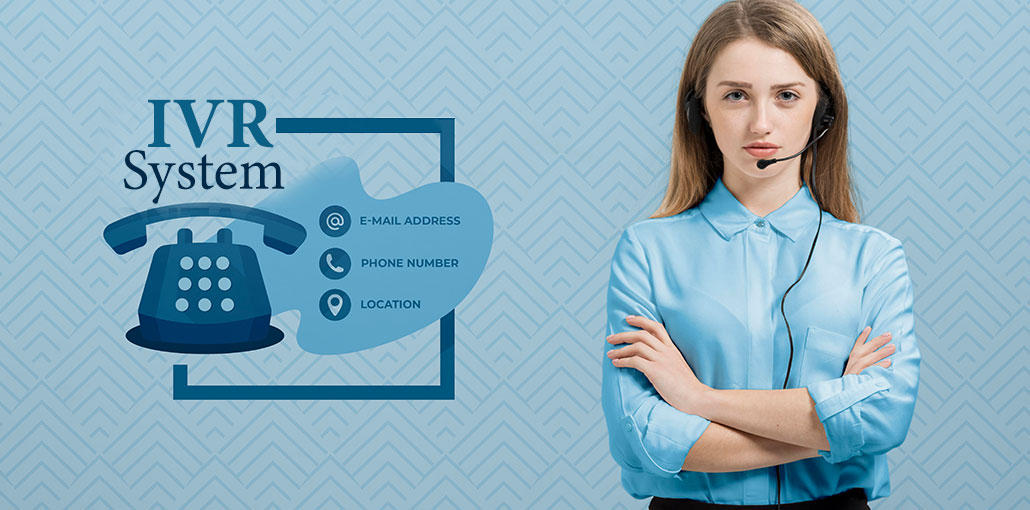Small business owners are likely to be looking for ways to maximize the productivity of their employees and save money. IVR systems are an affordable way for customers and employees to simplify the call process. However, there are so many options that it can be hard to decide where to begin the IVR adoption process.
This guide will help you understand IVR from its basics to the features you should be aware of, and recommended services so that you can make informed decisions.
What is IVR?
IVR stands for Interactive Voice Response, but in business terms, it refers to many software-based communication options. Some IVR companies provide basic services to allow small businesses to record voicemail messages and route calls. Others offer CRM, website, and database integration, as well as robust reporting options and bill processing options.
IVR was used only for telephone calls in the past. An automated voice recording would speak to a client during an IVR call. In return, the client would press the appropriate buttons to navigate the system. Many IVR systems today have speech recognition, which allows people to speak directly to the system instead of pressing buttons. However, there are still low-cost IVR services available that provide button-response options.
Another term that you will see on IVR company websites is visual IVR. Companies that offer visual IVR often also offer traditional phone IVR. Visual IVR basically moves the customer interaction from their phone (e.g. listening to a recording, pressing buttons), to a device such as a smartphone or a computer.
Customers can enter their details online and choose the type of customer service that they require. Calls can be routed immediately without having to go through voice-activated menus or touchtones. Customers can instead connect directly with customer service representatives via the website. They will receive a call from qualified reps or a number that will connect them to the right person.
Also read: Top 8 Business Phone Systems and Service for Small Business
Commonly cited reasons why businesses use IVR
The call volume you have and how you plan to use IVR in the business will determine which IVR system you choose. These are some of the most common uses for IVR and may help you choose what type of system to implement.
Customer Service
Businesses that expand rapidly often lack adequate customer support or staff. IVR systems are easy to deploy and scale, which can help reduce customer wait times. They also eliminate the need for employees to answer questions and route calls. An inbound IVR system will suffice for most customer service needs. However, if you anticipate needing outbound IVR, select an IVR company that provides comprehensive services.
Payment processing and collections
IVR is often used to automate collections and payment transactions. IVR services allow customers to call companies and get their billing information, account balances, then make payments. Although IVR systems that allow payment processing can be more costly than those that do not, many companies find that they are still cheaper than hiring customer service representatives to process payments.
Marketing and communication
Outbound IVR can also be used to market, alert potential customers about new sales or products, and communicate with customers. An outbound IVR system might be used by a dentist’s office to remind customers about upcoming appointments. A call center may use IVR to pitch potential clients. Marketing is the driving force behind your company’s adoption of an IVR system. Look for companies that are specialized in predictive dialing and call-center IVR.
Features of IVR
Cloud or onsite
Hosted IVR places the IVR system in the cloud. The vendor is responsible for maintaining and managing telecommunications equipment and servers. On-site IVR integrates with existing business telephone systems and falls under the responsibility of the company. Cloud-based IVR is available from most companies today. Unless your business has a specific reason to keep your system on-site it’s best to go with a hosted service.
Outbound or inbound
These are the two main types of IVR services. Inbound IVR systems handle outbound calls while outbound IVR services dial on a partial or full automatic dialing basis. Many companies offer both outbound and inbound IVR services. However, IVR services for inbound call handling tend to be more expensive than those for outbound calls. Be sure to clarify the IVR functionality that you need before you start shopping around.
Speech recognition
IVR system with built-in speech recognition allows users to respond to questions aloud rather than using their phone’s keyboard. A simple touchtone system is likely to be sufficient for basic IVR systems that route calls into your company and provide basic information such as your location and operating hours. While speech recognition systems are more costly than basic touchtone systems, they can still be a good investment if you have more complex IVR requirements.
Self-service IVR
If an IVR company offers “self-service” IVR, this usually means that the product/service is designed for inbound calls. There are many companies that offer IVR services and then separate, cheaper, self-service IVR options. Self-service is the best option if your business requires only call routing and bill payment, but you don’t require outbound calling. You should note that not all self-service options have speech recognition.
Also read: Know Your VoIP Phone System With This Helpful Glossary
Text to Talk
Asking if your IVR charges include text-to-talk is a good idea. Text to talk sounds exactly like it is. You can set up IVR system prompts with text to talk by simply typing in the prompt (“Please press 4”), then selecting from a list of voices to speak that prompt. This service provides a consistent and professional sound for your IVR system and eliminates the need to hire a voice actor or record them in-house. Ask about any limitations on text-to-talk and the limits on how often your menus can be changed.
Integration
Some IVR companies may not offer complete integration with existing websites, CRM systems, and databases. Although integration services are more expensive than those that do not, they offer a lot.
An IVR system without integration will require callers to tell a person who they are, their customer ID, and any other relevant information. The live customer service representative will need to access the CRM or database and look up the customer’s past. Integrated systems allow customers to call in and type their name or password. The IVR system will then instantly access the customer’s information.
For automated bill payment through IVR services, integration is crucial. Integration is also important for providing better customer service. It makes it easier for clients to access their information, and for representatives to access the information for the client to which they are speaking.
Analytics and dashboard
Ask for a demo to see the IVR system’s dashboard. Also, inquire about viewing analytics and pulling reports. The dashboard can be viewed ahead of time to give you an idea of how easy it is to access and modify your IVR system. Before making your final decision, you should consider data reports that may be of value to your company.
IVR Prize
IVR systems are not like other tech solutions. They come in a wide price range. On-site (not hosted), telephony systems are the most expensive IVR systems. Installing an in-house system can involve paying rental fees for phones and servers, ongoing maintenance fees, and software fees.
These systems can cost thousands of dollars to set up and high monthly fees. Hosted services are preferred by most SMBs because they are less costly and easier to implement. Hosted IVR services come with a variety of pricing and service fees.
Cloud services that are the most affordable typically offer IVR at a monthly subscription fee. Rates start at $50 per month per user and go up to more than $100 per month per user. These pricing structures don’t come with service contracts and can be canceled or modified at any time. You will be able to choose the level of service that you want. This includes how many features and how many minutes IVR you get. Be aware of overage fees.
Cloud services that offer integration, analytics, and speech recognition are more expensive. The terms and prices vary depending on the features and how many lines are being used. You can request a quote from the company’s website if you are interested in a more complete system.
List of IVR service providers
1. 8×8
Primarily for large-scale businesses, 8×8 offers IVR systems that are specifically designed with call centers in mind. Large corporations love 8×8, which offers CRM integration, contact center analytics, and multichannel communication (phones, webs, email, chat).
2. Aspect
Aspect Call Center offers everything from IVR services to chatbots and interactive text response. Aspect products can be integrated into CRM systems to meet enterprise-level client needs. They can also be packaged to include detailed reporting and analytics.
3. CallFire
CallFire’s IVR offers a wide range of options, including inbound and outbound calls as well as polls, surveys, polls, and call routing. It also allows for appointment reminders, payment processing, and appointment reminders. CallFire’s technology is based on keypad responses, rather than verbal ones. Users can also set up their own systems using their drag-and-drop menu.
4. Century Link
Century Link provides voice and touchtone IVR services in multiple languages. Century Link’s IVR is suitable for any business, but especially for call centers.
5. Five9
Five9 is a well-known cloud contact center software company. Five9 is a trusted provider of outbound and inbound IVR services. Five9 offers small-business targeted cloud solutions that include integration with CRM packages, analytics, and monthly or annual pricing. There are no long-term agreements.
6. Freshdesk
Freshdesk’s IVR allows small businesses to hide their phone numbers and use alternate numbers for IVR purposes.
7. Genesys
Genesys offers clients access to a range of customer service software solutions. This includes IVR that is comprehensive enough for enterprise-level calls centers. Genesys offers many benefits, including voice self-service, multichannel routing, CRM integration, and outbound dialing.
8. inContact
InContact’s IVR software allows customers to choose which type of assistance they need, including self-service and speaking with an agent. It supports text to speech and automated speech recognition. Customers who are unable to wait for a representative to call can also use the automatic callback feature. InContact’s IVR system integrates well with many CRM applications.
9. New Voice Media
NewVoiceMedia’s Internet Voice Response (IVR) is a self-service and cloud-based solution. New Voice Media allows businesses to modify their IVR menus in order to adapt to changing customer behavior, without needing to contact IT support.
10. Plum Voice
Plum Voice offers both cloud-based, comprehensive IVR services. These include speech recognition and text-to-speech, as well as a variety of inbound IVR systems that are less expensive.
11. Pronexus
Pronexus offers self-service IVR, which can be customized and multilingual. It also provides text-to-speech and predictive dialing services for outbound calls. Pronexus also has the ability to poll or provide specialties such as patient notifications (for healthcare).
12. Smart Action
Smart Action is a state-of-the-art IVR powered by AI. Smart Action provides self-service voice IVR and SMS text messaging. It also provides chatbot services, Skype communications, and SMS texting. Smart Action is more suitable for large and medium-sized businesses than it is for small and microbusinesses.
Also read: What Is a Voice Chat and Why It Helpful for Business Strategy
13. Synclio
Synclio claims that its clients can get a phone line within 30 seconds. SMBs can program phones to answer common questions, route phone calls, recognize keypad prompts, and respond with voice commands. Synclio also provides live reception outsourcing.
14. Talkdesk
Talkdesk offers more than 25 pre-built connections and extensive reporting features, making it easy to implement IVR solutions. Talkdesk products are perfect for enterprises that require advanced analytics and highly customizable services options.
15. Telzio
Telzio offers business VoIP systems that include IVR features such as call routing, menus, custom recorded greetings, and call routing. Businesses have the option of forwarding calls to operators if they don’t answer IVR prompts.
16. Upwire
Upwire provides affordable IVR, voice SMS, and email communications solutions. It doesn’t require any IT knowledge or programming to set up. Upwire, like other DIY companies, offers an easy-to-use drag-and-drop interface that makes setting up your IVR system quick and simple.
17. Verascape
Verascape provides a number of cloud-based IVR services including self-service and text messaging, bill payment, order processing, and outbound notification. Verascape offers a free 30-day trial of self-service SMS and/or self-service IVR without any transaction or setup fees.
18. VoiceGuide
VoiceGuide offers a low-cost, $99 per-line on-premises and cloud IVR systems. Easy to integrate them into existing systems. VoiceGuide also offers clients an easy interface to build their IVR menus. VoiceGuide
19. Voicent
Voicent’s IVR system is designed for customer service, marketing, and communication. The base cost for cloud pricing starts at $19 per month. Customers can then select the plans and features they want. This means you only pay for what you use.
20. Voicestamps
Voicestamps is a specialist in IVR systems that allow secure telephone payments to be processed. Voicestamps is compliant with FTC, PCI, and FCC guidelines and can be used for general payment processing and bill collection.










Leave a comment